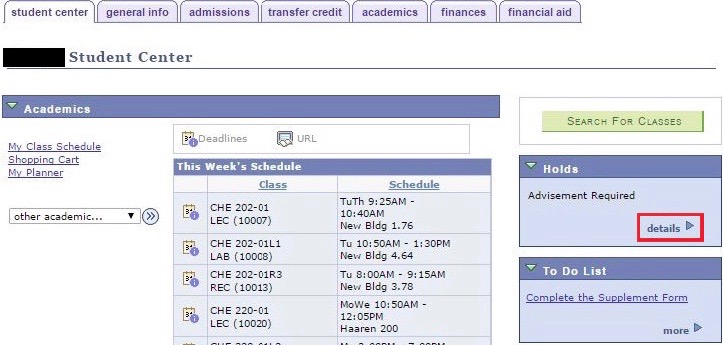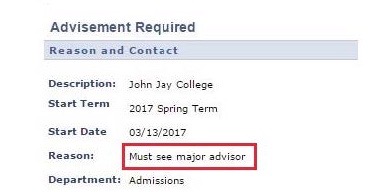Applied Mathematics Major Resources
Cryptography is the science of both personal and institutional data security. Students learn to secure information, maintain data integrity, authenticity, and non-reputability. Cryptography plays a vital role in detecting events yet to unfold, especially when attempting to interdict and thwart incipient cyber intrusions and terrorist attacks.
Here you will find:
- Key information about your major
- How and when to meet with your major advisor
- Planning tools that will help you track your progress in the major
- Ways to explore career opportunities related to the Applied Mathematics major
Take a few moments to look at the information below. It will help you plan effectively and avoid surprises during your studies at John Jay. Please visit the Department of Mathematics & Computer Science website for information, resources, and opportunities!
Concentrations
Data Science plays a critical role in analyzing large data sets which may have valuable information that is obscured by the sheer volume of the data itself. In the Data Science concentration, students will learn the principles of data representation, big data management, and statistical modeling. They will also be able to use computers to reveal hidden causal and temporal relationships in large data sets.
Students will:
- Use mathematical methods to analyze and recognize the properties of large data sets as well as any anomalies.
- Use suitable models such as linear regression, logical regression, to analyze data and predict probability distributions.
- Recognize clustering in large data sets and explain its significance.
For Data Science course requirements, refer to the Undergraduate Bulletin in the Major Requirements section below.
Cryptography is the science of data security, both personal and institutional, and as such is also an important component of justice. In the Cryptography concentration, students will learn to secure information which is achieved by assuring privacy as well as other properties of a communication channel, such as data integrity, authenticity, and non-reputability, depending upon the application. They will devise systems for companies to resist the unwarranted intrusions of hackers, to protect internal company and consumer data, and to act as consultants to research staff concerning the implementation of cryptographic and mathematical methods.
Students will:
- Use the mathematics upon which specific cryptographic algorithms are based to analyze the strengths and weaknesses of cryptographic schemes.
- Guarantee authenticity and integrity of data and ensure that transactions are non-repudiable, when appropriate.
- Develop cryptographic algorithms.
For Cryptography course requirements, refer to the Undergraduate Bulletin in the Major Requirements section below.
Applied Mathematics Requirements
You are responsible for the major requirements that are in effect when you declare the major. To confirm the requirements you should be following, go to the Undergraduate Bulletin for that academic year. For example, if you declare the Applied Mathematics major in Fall 2017 or Spring 2018, you will refer to the 2017-2018 Undergraduate Bulletin. If you declare the major and then leave the College for more than one full semester, you’re responsible for the major requirements in effect when you return, if they have changed.
Below, find the Undergraduate Bulletin that was in effect when you declared the major.
- 2024-2025 Undergraduate Bulletin - Applied Mathematics
- 2023-2024 Undergraduate Bulletin - Applied Mathematics
- 2022-2023 Undergraduate Bulletin - Applied Mathematics
- 2021-2022 Undergraduate Bulletin - Applied Mathematics
- 2020-2021 Undergraduate Bulletin - Applied Mathematics
- 2019-2020 Undergraduate Bulletin - Applied Mathematics
- 2018-2019 Undergraduate Bulletin - Applied Mathematics
- 2017-2018 Undergraduate Bulletin - Applied Mathematics
Major Advising
In Fall 2025, Applied Mathematics major advising will be done both in person and remotely. All Applied Mathematics majors at any time--particularly juniors and seniors --are welcome to email Professor Johnson (hujohnson@jjay.cuny.edu), Professor Alberto (galberto@jjay.cuny.edu), or Professor Puls (mpuls@jjay.cuny.edu ) to request an appointment. That major advisor can then arrange a meeting at a mutually convenient time, whether in person or on ZOOM. Each of us has our own personal ZOOM url which we can forward. We are happy to discuss upper division electives, progress towards graduation, career choices, graduate school possibilities, or any other questions related to the major.
NOTE: The Math and Science Resource Center (msrc@jjay.cuny.edu ) can provide tutoring for math courses.
Major Advisors:
Professor Hunter Johnson
Mathematics & Computer Science Department
212-237-8846
Please email Professor Johnson for an appointment.
Professor Genesis Alberto
Mathematics & Computer Science Department
212-237-8685
Please email Professor Alberto for an appointment.
Professor Michael Puls
Mathematics & Computer Science Department
212-237-8925
Please email Professor Puls for an appointment.
Applied Mathematics majors are encouraged to meet with a major advisor as early as possible if you have any questions regarding course placement or wish to discuss course registration for subsequent semesters. If you do not have a copy of the Mathematics & Computer Science advising brochure, please obtain a copy from the Department of Mathematics and Computer Science at your earliest convenience. Electronic copies are available upon request. Along with the Sample Four Year Plans available on this site, the brochure will help you complete your Applied Mathematics program in the most efficient way.
Applied Mathematics students who would like major advising during Summer session (June 2 - August 25) 2025 are welcome to email Professor Johnson (hujohnson@jjay.cuny.edu) or Professor Puls (mpuls@jjay.cuny.edu ) to request an appointment.
Sophomores with 45-59 credits may have a hold on their registration. The hold will be removed when they have a major advising appointment with one of the listed Applied Mathematics major advisors. This discussion will encourage wise planning and allow students to ask any questions they may have about the major. How do you know if you have a major hold? Go to CUNYfirst and complete the following steps:
- Check the Holds box of your CUNYfirst Student Center. If "Advisement Required" appears, click on “details.”

- Click on “Advisement Required.”

- See which type of advisement you need. If you must see a major advisor, then make a major advising appointment following the steps preferred by this department.

Plan Ahead: Graduate on Time
The Applied Mathematics major has several courses that build on each other in a sequence, so it is important to be aware of this and plan accordingly. There are two gateway course sequences in the major, the calculus sequence and the sophomore programming sequence.
- The calculus sequence consists of three 4-credit courses: MAT 151 Calculus I→ MAT 152 Calculus II → MAT 253 Calculus III. Based upon your placement, you may be required to take MAT 141 Precalculus before enrolling in MAT 151 Calculus I. Be sure to prioritize these courses and to complete the sequence without interruption in order to graduate on time.
- The sophomore programming sequence consists of two 3-credit courses: CSCI 171: The Nature of Computers and Computing → CSCI 172: Introduction to Data Science. You must complete these courses by the end of your sophomore year in order to graduate within four years. You may also opt to take these courses during your freshman year. Part time students should also give these courses priority after the calculus sequence in order to complete major requirements in the shortest time frame possible.
Additionally, keep these guidelines in mind:
- Try to complete MAT 265: Elements of Mathematical Proof and MAT 310 Linear Algebra during your sophomore year.
- The Applied Mathematics major offers two 12-credit concentrations: Data Science or Cryptography. Each concentration consists of four 3-credit courses. After completing the calculus sequence, the sophomore programming sequence, MAT 265, and MAT 310, students may begin to pursue their concentration.
- You will need at least a 2.0 in the major and at least a 2.0 overall GPA to graduate.
- DegreeWorks degree audit - Use this online planning tool to track your overall progress toward graduation. You will see which of your general education and major requirements are completed, in progress, or still needed. Refer to the DegreeWorks FAQs to better understand how to use this helpful tool.
- Applied Math Major Checklist - Fill out this printable worksheet to keep track of which major requirements you have completed and which ones you still need.
- See our Sample Four Year Plans for Data Science students beginning with MAT 141, Data Science students beginning with MAT 151, Cryptography students beginning with MAT 141, or Cryptography students beginning with MAT 151. Each sample plan provides an example of how you could complete all your degree requirements (major, general education, electives) and graduate in four years. Remember that each plan shows just one possible way to combine your requirements. Transfer students in particular should work with advisors to determine a plan that works best for them.
A General Academic Advisor will confirm what general academic requirements you still need, make suggestions about smart course planning that will help you graduate without delays, discuss your interest in adding a minor or second major, inform you about opportunities such as study abroad, discuss general questions and concerns, and make helpful referrals. Visit the Academic Advisement Center's webpage for more information.
Applied Mathematics and Your Career
Listen to Professors Samuel Graff and Hunter Johnson talk about what the Applied Mathematics major is, what you can specialize in, the range of careers this foundation prepares you for, and how the study of mathematics is actually a way of exploring the nature of truth!
The curriculum offers an integrated academic program with the depth and breadth necessary to make graduates truly competitive in the job market. Both concentrations provide the knowledge and the skills that are in demand in high tech entrepreneurship, finance, modern communications, medicine, security, transportation, and manufacturing. The New York City metropolitan region repositioning itself as a nexus of technological innovation and discovery, as well as a haven for entrepreneurial leadership. Such a metamorphosis requires the availability of a renewable workforce possessing skills in data analysis and data security. Consequently, employment opportunities are expected to be available for applied mathematics graduates for the foreseeable future.
John Jay’s Career Learning Lab is another great resource for questions related to job searches, internships, and career preparation. CLL staff are available to meet individually with students and alumni in L72.00 New Building. You can schedule an appointment or attend their walk-ins.
The following resources from professional societies provide helpful career information:
SIAM (Society for Industrial and Applied Mathematics): Thinking of a Career in Applied Mathematics
ACM (Association for Computing Machinery): Cryptograph and Security
The Applied Mathematics major’s required mathematics core aligns well with the core requirements of other CUNY mathematics programs, affording graduates a wide choice of subsequent educational opportunities. As a graduate of the Applied Mathematics major, you will be well prepared to enroll in a range of masters and doctoral programs, such as Digital Forensics and Cyber Security, Data Analytics, Financial Mathematics, Machine Learning, Traditional Mathematics, Mathematics Education, and the MPA Programs offered by John Jay.
Though the major only requires two math electives, if you are planning to pursue graduate study, be sure to take the following three electives: